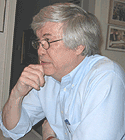Robert E. Beard • Linguist
 Robert E. Beard (1938- ) is a linguist whose specialty is morphology (the study of words). He was born and raised in Fayetteville, NC, the son of Kathleen and LaVerne Beard. He completed his undergraduate studies at the University of North Carolina and received his PhD in Slavic Linguistics at the University of Michigan in 1966. Beard served as head of the Russian and Linguistics Programs at Bucknell University, where he taught for 35 years (1965-2000), holding the Ruth Everett Sziezega Chair in Linguistics for two terms.
Robert E. Beard (1938- ) is a linguist whose specialty is morphology (the study of words). He was born and raised in Fayetteville, NC, the son of Kathleen and LaVerne Beard. He completed his undergraduate studies at the University of North Carolina and received his PhD in Slavic Linguistics at the University of Michigan in 1966. Beard served as head of the Russian and Linguistics Programs at Bucknell University, where he taught for 35 years (1965-2000), holding the Ruth Everett Sziezega Chair in Linguistics for two terms.
In 1997 he received the award for Excellence in Teaching from the American Association of Teachers of Slavic and East European Languages and, in 1996, the Best Educational Website award from the same organization. Beard is the author of three scientific monographs, The Indo-European Lexicon (1981), A Bibliography of Morphology (1988), Lexeme-Morpheme Base Morphology (1995), and three privately published trade books, The 100 Funniest Words in English, The 100 Most Beautiful Words in English, and The 100 Most Interesting Words in English. He has also published numerous articles on morphology in the leading linguistic journals and many articles about him and his website have appeared in the New York Times, Washington Post, Chicago Tribune, among others.
In his writings, Beard develops a theory of morphology called Lexeme-Morpheme Base Morphology. The centerpiece of Beard's work is his Separation Hypothesis, the hypothesis that the meaning and sounds of words are processed as separate mental operations, is now widely accepted. Beard makes a sharp distinction between lexemes (noun, adjective, verb stems) and morphemes (affixes, clitics, 'function words', and the like). In his work he showed that while sound and meaning are directly related in lexemes, it cannot be in morphemes. While it might seem that the suffix -er means "one who" in words like baker, runner, talker, that does not work with (a) cook, (a) guide, where the meaning is present but without a suffix. Suffixes also appear in words without meaning, e.g. syntactic - syntactical, drama - dram-at-ic. Beard concluded that the rules which add meaning to derived words like these must operate independent of the rules that attach the suffixes.
After retiring from Bucknell, Beard became one of the founders of the popular linguistic website, yourDictionary.com, writing under the pseudonym "Dr. Language". He now owned and headed The Lexiteria, a language product and services company for 10 years (2004-2014). He now owns and writes at alphaDictionary.com under the pseudonym "Dr. Goodword".



